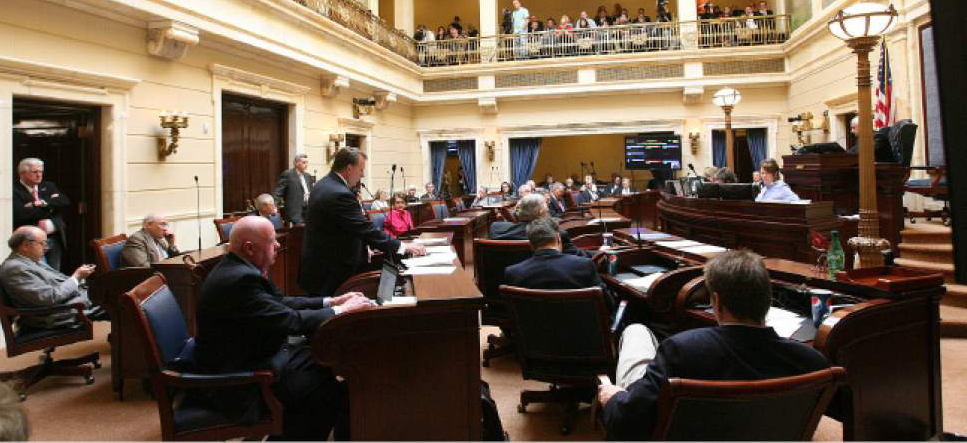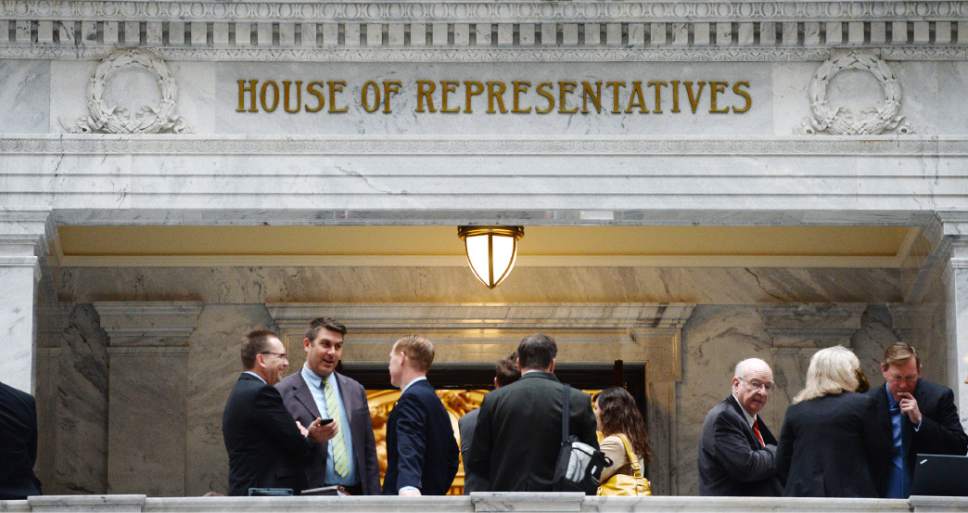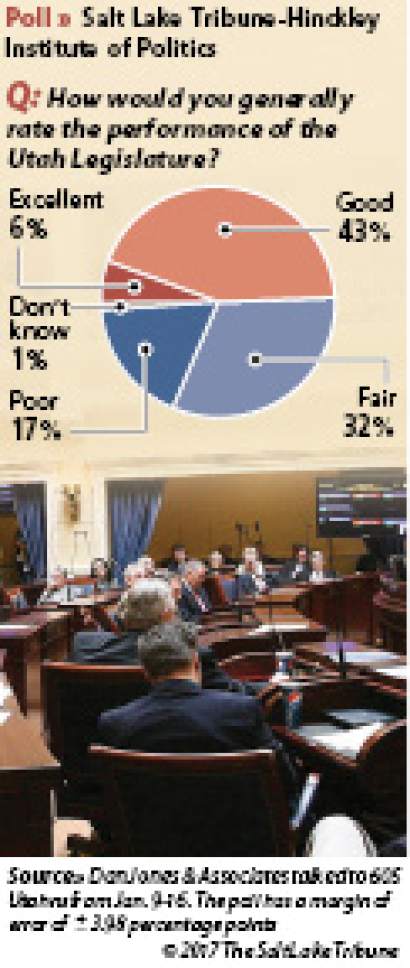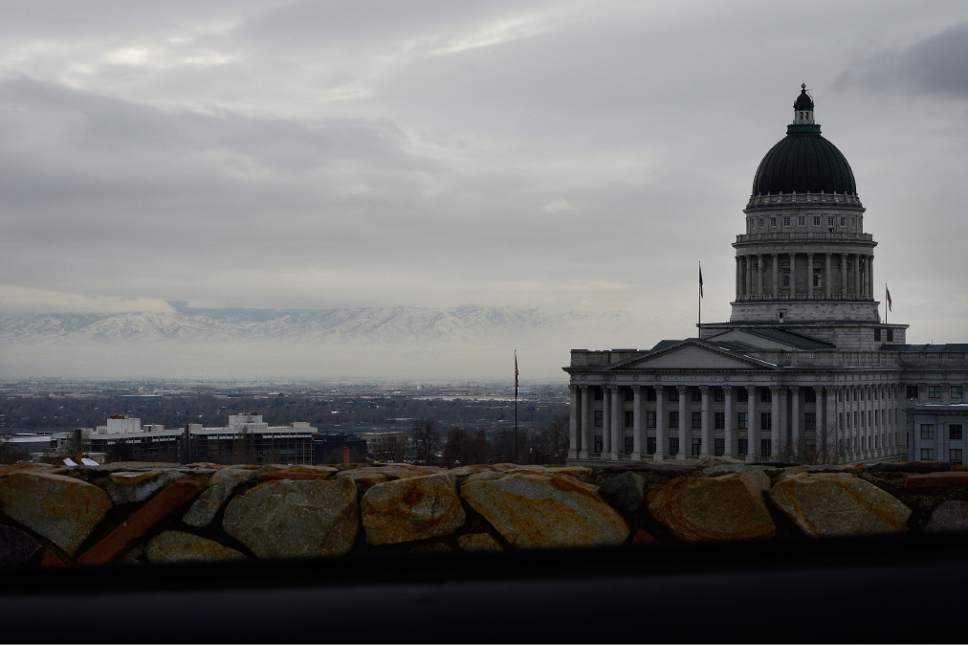This is an archived article that was published on sltrib.com in 2017, and information in the article may be outdated. It is provided only for personal research purposes and may not be reprinted.
Utah Republican and Democratic legislative leaders often disagree. But they are unanimous about what the biggest topic facing the Legislature is as it convenes Monday: education funding.
"It's one of our greatest challenges," says House Speaker Greg Hughes, R-Draper.
House Minority Leader Brian King, D-Salt Lake City, agrees, and adds that while leaders often give lip service to education, "It's time to put our money where our mouth is."
It will have extra emphasis because the Our Schools Now initiative is waging a petition drive to put on the ballot a $750 million state income-tax increase for education, and many lawmakers would like to avoid that and push other alternatives instead.
Legislative leaders also see other major debates looming on homelessness, medical marijuana, transportation funding, clean air, public lands, perhaps Medicaid expansion and more.
There are even some hints that some tough negotiating might do away with the much-maligned Zion Curtain — a 7-foot barrier required in new restaurants to prevent children seeing drinks mixed and poured — in exchange for other stricter changes in alcohol law.
Before the Legislature begins wrestling with its array of complex, sometimes controversial issues, members received mixed reviews in a new Salt Lake Tribune-Hinckley Institute of Politics poll. It found 49 percent of voters approve of lawmakers' performance, and 49 percent disapprove. As far as legislative popularity generally goes in such polling, that's not bad.
Not surprisingly, Republicans like Utah's heavily GOP-dominated Legislature much more than Democrats. The poll showed that 80 percent of Republicans gave the Legislature a favorable rating, as did 70 percent of unaffiliated voters, while only 11 percent of Democrats did.
"That is good news," Hughes said. "I worry sometimes that the formula to being popular politically is to do nothing… But we do hard things. We do difficult things."
He adds, "I tell my colleagues if it's impactful and will make a difference, it's going to be hard." He said he believes Utahns like "our body of work, and that we're trying to use good information to drive good decisions."
—
Education • "The funding of education is what we are really looking at this year," said Senate Minority Leader Gene Davis, D-Salt Lake City. "There's not a lot of new money to play with. And previous commitments already pretty much take care of " what little is available.
That comes as lawmakers are looking at whether to support the $750 million tax hike proposed by the Our Schools Now initiative, or push alternatives. Initiative supporters say such a big hike is needed to pull Utah out of last place for per-pupil spending.
However, "I think this Legislature would like to avoid an initiative," said Senate President Wayne Niederhauser, R-Sandy. Many legislators believe that higher income tax could hurt the effort to recruit new business, harm the economy and so actually produce less revenue overall for schools.
"It's very difficult for a legislature elected by the people to raise taxes, especially that significantly. We did it two years ago with the gas tax and the statewide levy [for education]. That was difficult, and I think it was only about $125 million. This is many times that size," he said.
So Niederhauser said, "We will be working with people who are behind the initiative to try to figure out something that can be done."
Proposals have ranged from restoring full sales tax on food to eliminating income tax deductions for children, better collecting tax on internet sales or raising the gas tax to eliminate general fund subsidy of roads and allow shifting money to schools.
King said Democrats are working on a comprehensive proposal of their own for education funding.
—
Homelessness • Prodding Salt Lake City to move forward with four new shelters and resources for the homeless — despite controversy over sites selected, and a less-than-public process used — is also high on the agenda.
"That's the biggest issue of all for me personally right now," Hughes said, who has pressed to keep local leaders on a timeline for drawing down the homeless population at the downtown shelter and adopting a new model to address the problem.
He adds that homelessness "is at a crisis. We don't have time to [delay] anymore or talk about it."
Niederhauser added, "I think the Legislature is going to hold feet to the fire. We want to see substantive changes, and funding is going to be conditional on those changes being put in place.
—
Public lands • Niederhauser expects plenty of calls early in the session for the new Trump administration to overturn Barack Obama's creation of Bears Ears National Monument.
"There will be a push to try to get the administration and Congress to do something," he said. "There's nothing we can do at the state with legislation. It's out of our jurisdiction.
While Republicans are expected to continue the yearslong fight against federal control of public lands, King said Democrats will push for better stewardship and protection of lands — saying it may be good for the economy because most businesses come here because of beauty and resources the state offers.
—
Medical marijuana • Most leaders expect renewed debate on medical marijuana, but don't see much passing into law.
"The Legislature in general, and me specifically, are opposed to [authorizing state marijuana] dispensaries," Niederhauser said. "If we can get medical marijuana to be distributed in proven dosages through a pharmacy, we're all over that."
Self-dosing dispensaries are against federal law, and federally insured banks can't do business with them, forcing them to operate as cash-only businesses, Niederhauser said. "Those are real negatives to doing anything."
—
Transportation • Legislators are discussing bonding, or borrowing money, to accelerate construction of long-planned but yet-to-be-funded highway projects.
"These are projects that are already programmed and are in the hopper. There's discussion about whether you would save money by doing them sooner rather than later," Hughes said.
He notes certain heavy traffic areas that need expanded capacity — want he calls "pinch points" — that need attention. "For example, Lehi has such growing pains," and construction may be needed there sooner than later.
—
Alcohol • "I know there's a lot of talk about getting rid of the so-called Zion Curtain," Niederhauser says, giving it some chance of success.
"There needs to be a solution to leave restaurants as restaurants and bars as bars," he says, adding many legislators still want to keep the Zion Curtain because "we don't want to glamorize [drinking] for children."
Niederhauser stopped short of specifics but said "There seem to be some positive things happening, so we might see a breakthrough with that."
However, he noted, the LDS Church is "going to be very reticent about a major change without some compensating change to go with it."
Some lawmakers are discussing passing tougher drunken driving laws, such as lowering the .08 blood-alcohol level for being considered intoxicated to .05. If enacted, Utah would be the first state to adopt such a standard.
Still, he said, "I want to be clear that it's a long road before we make major changes."
The Church of Jesus Christ of Latter-day Saints, which teaches against consumption of alcohol, has a huge voice in liquor legislation considering that eight of every nine legislators are Mormon.
—
Clean air • As winter inversions make the air murky as the Legislature convenes, pollution and air quality will again be a hot topic on Capitol Hill.
"It's something we will continue to work on. We've got people's attention on it," Davis said.
King foresees "incremental progress with several small bills. There's no one magic bullet that will take care of pollution."
"There's more to do," Hughes agreed.
—
Medicaid expansion • Last year, the Legislature ended a yearslong fight by passing a limited extension of Medicaid to cover 9,000 to 11,00 people who are chronically homeless, involved in the justice system or in need of mental-health or substance-abuse treatment.
It defeated other proposals that would have covered an estimated 110,00 poor Utahns, with federal assistance through the Affordable Care Act.
But the Barack Obama administration never approved waivers to rules needed for the Utah plan. So Niederhauser said it is possible the Legislature could consider more tweaking if required by the new Trump administration.
Some local leaders — particularly Salt Lake County Mayor Ben McAdams — are pushing for the release of $30 million set aside previously but never spent because of the unresolved waiver issues. If lawmakers went along, the money would be used for homeless medical and mental-health services.
Democrats will also again push for full Medicaid expansion, Davis said, even though Republicans have given it little support.
"We look at the homeless problem in Salt Lake City, and part of it comes because they can't get treatment through Medicaid expansion."
—
Election laws • After last year's unusual election, numerous bills have been introduced seeking a variety of reforms.
"People still standing in line at the midnight hour to vote is not a process we want to repeat," Hughes said.
He expects a fight over likely proposals to extend experimental programs to allow Election Day voter registration because that may have contributed to long lines.
Other bills may make it easier to add more in-person voting places in counties that vote primarily by mail.
Another expected bill would allow Utah to join a compact aimed at ensuring the winner of the national popular vote — not the Electoral College — wins the presidency. Support for such a measure is uncertain.









